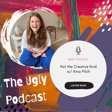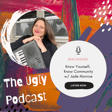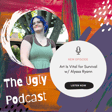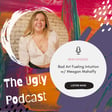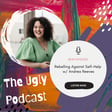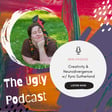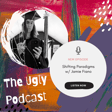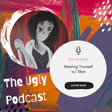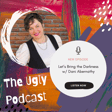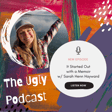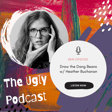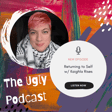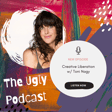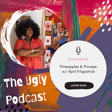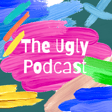Introduction to The Ugly Podcast
00:00:03
Speaker
Welcome to the Ugly Podcast. I'm your host, Lauren Alexander, she, they, and this is the place where creatives are encouraged to make messy, ugly art and let go of perfectionism.
00:00:14
Speaker
I started this podcast with my creative partner, Emerson, and we've since grown into our businesses. And this podcast is now evolving into a space where I interview other creatives to discuss our creative processes and how we navigate the mental mind field of creativity. This podcast serves as a reminder that you and your art get to be whatever the hell you want to be, ugly and all.
Introducing Alex and Novel Marathon
00:00:42
Speaker
Hello and welcome back to The Ugly Podcast. I'm your host, Lauren Alexander, and my guest today is the host and producer of Novel Marathon, a companion podcast for writing the first draft of an 80,000-word novel over the course of a year. She's currently working on the first draft of her first novel, which is very bad as it should be. Her words, not mine. And a collection of personal essays. Her work has appeared in The Sun, Nightingale and Sparrow, Mason Street,
00:01:12
Speaker
embryo concepts and mother well. You can find her on Twitter and sub stack and Instagram at at novel marathon. Welcome.
Starting a Podcast for Accountability
00:01:20
Speaker
Can you please just give us your name and your pronouns, please? Yeah, so I'm Alex, aka the undercover novelist, pronouns are she her. And I don't know if I have anything to add to the wonderful introduction. Thank you, Lauren.
00:01:39
Speaker
But yeah, I'm the host of Novel Marathon. I started it on a whim at the beginning of this year. It started being a podcast, but now it's also a subtext newsletter, same title, Novel Marathon. And that's me. Amazing. So tell me a little bit more about what made you, you said you started it on a whim, but what was the buildup to it?
00:02:05
Speaker
I mean, so actually, to be honest, I was sort of curious about doing a podcast. And I'm just listening to a lot of podcasts. And I was wondering whether I could come up with an idea. But the problem is also that most people that I'm sure listening to this, like anybody else, I'm very busy. And so I thought, well, what podcast could I do that actually aligns with other goals that I have?
00:02:35
Speaker
And, you know, writing a novel is just something that has always been in the back of my mind. In 2021 I was more focused on
00:02:49
Speaker
publishing, you know, some shorter pieces, you know, you mentioned that some of some of those gotten published. But there is also still there was always this idea of, if, if you want to be a writer, you have to write a novel, which is probably wrong, everybody. This is probably not true.
00:03:08
Speaker
But I don't know. I'm a little bit older and I'm like, well, I should just try it. I should just attempt it. And if I make it a bad novel, then there's really no pressure. Because shouldn't anybody be able to write a bad novel? So you just set the bar really low. Not high. How about low?
Structure of Novel Marathon
00:03:33
Speaker
Set the bar really low. And then I thought, okay, I can do a podcast about that because then it aligns with this other goal. So then the podcast is essentially my own, you know, accountability mechanism for getting writing done. Yeah, that's such a good idea. I like that you aligned it with your goals and like, no, I'm going to keep showing up and I'm going to keep offering what I learned to the people who want to listen.
00:04:02
Speaker
It's a really generous and selfish way to do your work. Honestly, that's what helps me. I just started a group called The Writer's Helm, and some of it is so much like I want to share what I have with other writers, and then a lot of it is, and you're all going to keep me accountable because I'm really bad at keeping myself accountable. That's exactly it.
00:04:27
Speaker
And just to let everybody know, it's not going perfectly, but that's why we are on the Ugly podcast. We're not on the Perfection podcast. Exactly. And I'm a little bit behind because writing a novel and doing a podcast and writing a newsletter and having a career and having a family turns out is a lot. So, you know, that's a surprise. Shocking, really.
00:04:57
Speaker
But it's also not going terribly. It's just somewhere in the middle. And I sort of always have a plan of how I can catch up and how I'm going to get back on the horse. And I'm glad that I did it and I plan to continue. Yeah.
00:05:16
Speaker
What can listeners expect if they go listen to the novel marathon?
Companion Newsletter and Annual Plans
00:05:20
Speaker
What should their process be? If they've never listened to it before, what would that process look like and what could they expect for each episode?
00:05:29
Speaker
The Novel Marathon was actually based on one-year novelist, has 52 chapters, one chapter per week, and it really breaks down how to write a novel in a year. So I highly recommend it by Ellen Lilly. So that's a good one.
00:05:48
Speaker
And I was looking for a name for my podcast and I also was afraid of doing it on a weekly basis because that seemed like a really big commitment. So I was like two weeks. So 26.
00:06:04
Speaker
novel marathon. That's perfect. Right. So and also this idea of writing as a as a marathon, you know, sort of a steady steady jog as opposed to a short distance sprint. So what people can expect is if you want to start fresh, you can just listen to episode one.
00:06:27
Speaker
It's on Spotify, it's on Apple, if you search for a novel marathon. And then it's essentially a self-directed class. So you could listen to a new episode on your own time every week or every two weeks and then use that as a way to essentially structure a novel. And you don't really have to do a lot of additional reading, but I use the novel marathon to say, okay, this week we're reading.
00:06:51
Speaker
such and such and story genius or in Walter Mosley's book, This Year You Write Your Novel. So there's a little bit of a signed reading and then I break it down what's essentially in the readings and what some of the assignments are. So it's essentially talking you through writing a novel over the course of a year, over the course of 26 episodes. I also started a companion newsletter and you can sign up for that, novelmarathon.com.
00:07:20
Speaker
or on Substack, novelmarathon.substack.com. And that's just for people who like to read instead of listen to a podcast. So a lot of the content is the same.
00:07:31
Speaker
If you sign up for that also, you don't have to remember to listen to the podcast. You just get it in your inbox. And it's meant to be a companion for writers. It is loosely structured around the progress of a novel. So right now we're on mile 16. As we're recording this, by the time this comes out, we're probably going to be around mile 20.
00:07:55
Speaker
because the marathon is coming to an end by, you know, December stretch. Home stretch. Exactly. And then the other thing that people can expect is if they sign up for the newsletter or the podcast, it's just going to restart in January. So new year, new luck, new book, and we'll do it again. And we will probably write another bad novel just slightly better than the other one.
Alex's Writing Journey
00:08:25
Speaker
Excellent. I love that. So how much had you written before you started because you attempted NaNoWriMo in 2021, right? I actually, I attempted NaNoWriMo a really long time ago. I think it was actually when NaNoWriMo first started.
00:08:44
Speaker
Okay. And I was at an entry level job, the colleague next to me and the cubicle next to me told me about NaNoWriMo, and she did it. And then I think not that year, but the following year, I was attempting it. So this is probably 15 years ago, at least. Okay. And, and, you know, it didn't really go very well, because
00:09:12
Speaker
I just can't write 1600 words a day. Any, everybody who's out there, if you're doing it, you have my greatest admiration. My colleague would go next to me, you know, she would do things where she would fall behind and then she would just knock out 10,000 words on a Saturday. But that is just not me. Um, and then actually in my, if you want to know about my, sort of my relationship to writing,
00:09:38
Speaker
I took a bunch of writing classes. I was always looking for extension classes. I was taking some UCLA extension classes. And then I took some private writing workshop classes. And I also gravitated towards memoir for a while and more creative nonfiction. And then as I took more of these classes, I also learned that
00:10:08
Speaker
In a way, you know, there's a lot of nonfiction and fiction, meaning that, you know, people obviously use the material of their of their lives and their experiences and then achieve details and call it fiction. And once I wrapped my mind around that, I thought, okay, then maybe I can I can write a novel. So it was early NaNoWriMo attempts, you know, many years ago.
00:10:34
Speaker
failed NaNoWriMo attempt, then it was taking classes, then it was publishing some shorter pieces, mostly nonfiction. And then it was sort of learning and recognizing that there's a lot of nonfiction in fiction, which then made fiction seem more doable to me. Yeah. Yeah, that's a really good point. I like that.
00:11:01
Speaker
Hey writer, are you feeling adrift in your writing practice? Like the word swept you out to see, but you have no idea where you're going? Climb aboard the writer's helm. I'm Lauren. And I'm Gabby. And we're both writers and professional editors who are here to support you on your writing voyage. With the writer's helm, you get access to group co-writing sessions, Q&A sessions, our private community chat room, and group coaching calls to help you along no matter what stage of the writing process you're in.
00:11:26
Speaker
Members of our crew have said that they've reconnected with their excitement for riding and feel energized from the support they've received from us and each other. You can sign up for the riders' home at any time, which comes with a one-week free trial to make sure that we're the right crew for you. And if you sign up now during NaNoWriMo, use the code YOHO22 to lock in a forever rate of $37 a month. That's a monthly discount of $10. You don't need to navigate these stormy seas alone. Let the riders' home take you to new shores.
00:11:57
Speaker
Was there something specific that helped you realize that your first book could just be bad? Did you have a mentor or you read something or what kind of rang true to you where you're like, I'm gonna write a book, but it's just, it's gonna be bad and I'm gonna make it bad on purpose. So it's out there and it's terrible. So a few years ago, there's this book that came out, Mindset by Carol Dweck.
00:12:25
Speaker
And the idea is that you can either have a growth mindset or you can have a fixed mindset. And so the fixed mindset would be if somebody says, well, I'm just not a math person.
00:12:41
Speaker
it's just not me or I'm just not an artistic person or I'm just not a creative person and ironically you know I was always very good at school but if you're very good at school
00:13:01
Speaker
there's also this idea of, well, you either have it or you don't have it. And so then if you create something, there's this idea of whatever you create and how it turns out, that is the verdict of whether you are an artist or you're not an artist, or whether you are a musician or not a musician. And it's like the verdict
00:13:24
Speaker
And there is really no, it's almost like, you know, a litmus test of, yeah, you made this, it's bad. Well, therefore you are not an artist or you're not a musician or you're not a writer or you're not a mathematician. So that's the fixed mindset and the growth mindset is basically, well, I wrote a poem and maybe the poem is pretty bad or haiku. But if I practice writing haikus for a couple of months, then, you know, I'm going to get better.
00:13:53
Speaker
I may not become the poet laureate of the United States, but I'll probably get better. And so for me, frankly, reading this book, first of all, I realized that I had kind of grown up with a fixed mindset and that it was not too late to try to change it into a growth mindset.
00:14:22
Speaker
Yeah, I mean, at its core, it's just believing that your abilities can develop. So basically, it means that
00:14:30
Speaker
you write a bad novel. It does not mean that you are condemned for the end of your days to only write an addiction. It just means that your first attempt was bad and the next attempt will be better. And
Growth Mindset in Writing
00:14:44
Speaker
frankly, in order to get better, it might even be a good idea to move on more quickly to the second attempt or the third attempt rather than fiddling with your original version forever. Yeah.
00:14:58
Speaker
Absolutely. I've learned that so much with just like all of the little stories that I make, which are, I call them my ugly stories. And they're just these short, really dumb stories, usually about inanimate objects in my house. Um, but each time I, they might be terrible and I don't want to share them with people, but each time I can notice at least one thing that I did better that time. I'm like, Oh, I used this really cool description this time that I didn't think to use last time, or
00:15:27
Speaker
I think I showed motion really well in this one. Um, whereas I haven't quite figured that out in the past and each time it's just like a little thing that gets a little bit better. Yeah. Same with writing dialogue, you know, you can't, so, so my current goal is essentially writing five times a week, around 500 words. So I can sort of goof off on a Wednesday and a Friday and I can catch up on the weekend.
00:15:53
Speaker
Obviously, I think these goals that you set yourselves are obviously very personal, but even just writing regularly, you're noticing that formatting dialogue, writing dialogue just becomes easier because you've done it every day. It's just for 45 minutes a day. Yeah, absolutely. Have you read Bird by Bird by Ann Lamott?
00:16:18
Speaker
I read it. I mean, I read it kind of a long time ago, but I read it. I read so many. I read so many writing books. I read Steve King on writing. I did also Bird by Bird. I did The Morning Pages. I know clearly I've been sort of trying to crack the code on writing for a really, really long time. Do you think you've cracked it? No, I haven't cracked it.
00:16:46
Speaker
No, but I have accepted that trying is better than not doing it. And I've also accepted that, you know, it's
00:16:59
Speaker
like not writing is not an option for me. And I don't mean that dramatically in that I'm such an artiste, you know, it's like breathing air, I have to write, but it's just, it's like, I don't really foresee a world where I'm not going to attempt to write stories or, you know, nonfiction pieces. And what's really interesting is I have two children and, you know, my, my younger son,
00:17:27
Speaker
The writing gene is just coming through loud and clear. And I haven't done anything different or special, but he's just filling notebooks. He's sitting in the garden with a notebook, writing his story. Aw, that's so great. In his self-description, he's like, I live in a small house and I write stories.
00:17:50
Speaker
And I guess what I'm telling you is that at some point, you just have to accept that it's part of you. And then you can either look at this ability and say, oh, it's not perfect. Or you can look at it and say, well, it's just part of who I am. So I might as well just try. Yeah, exactly. Exactly.
Embracing Imperfection
00:18:15
Speaker
What I was going to say about Bird by Bird was that was the first time that I heard about the shitty first draft. And that was where I was like, oh, all writers do this. I mean, sure, there's some people who are geniuses and can crank out a story. That's amazing. But the majority of writers.
00:18:36
Speaker
It takes a few shitty first drafts to find that story. Yeah. Yeah. A hundred percent. I would also, I forget, I have to just look that up real quick, but Mary Carr, um, of the liars club, uh, the memoir, the liars club, she also has a writing book out, which I really enjoyed. I read it maybe two years ago and she talks about how, oh, it's called the art of memoir.
00:19:05
Speaker
And she talks a lot about how, you know, that she's really good at rewriting. She's, you know, essentially not giving up and she will
00:19:15
Speaker
go at it and just write a second draft, a third draft, a fourth draft. She really goes into detail in how extensive her redrafting really is. So it's clear that what you're reading by her is not what first came out of the computer or the pen.
00:19:39
Speaker
Yeah. And I try to encourage writers about this too, because as an editor, I see what comes to me. And I know that I'm usually towards the end of the process. That's already been through developmental editors. But even still, there are still parts that like
00:19:58
Speaker
As coming in as a coming in without having read it without knowing all of it. There's still parts that other editors missed that the author missed. It's just so hard to communicate everything that you have imagined in this story to a large audience of readers and it's okay. That's okay. And it's normal. So as I'm giving edits, I'm always like,
00:20:20
Speaker
this is awesome and I want you to know more. So it's not to make the writers feel like, oh, I did something badly. It's like, no, you didn't. You wrote this whole book and it's so good. And it needs a little more, you know? Yeah. Yeah.
00:20:35
Speaker
I mean, here's what I will also say about this. You know, if you have thoughts about being a writer, also, you know, Ira Glass actually has some good quotes about this because he basically says when you're starting out, and in his case, he was, you know, making radio pieces and audio pieces. And in the beginning, your ability in terms of what you're able to create,
00:21:05
Speaker
and your taste. There is a gap between it because if you have good taste, you know that what you're listening to is not perfect yet or is not at the highest level that you may be capable of. And sometimes for a lot of people that discrepancy between comparing it to a novel that they really love or a piece of art that they really love and what they're able to create in this given moment
00:21:34
Speaker
That's enough for people to give up. But the goal of making art is to realize that it really takes a lot of practice and revision and second attempts and third attempts and fourth attempts in order to close that gap over time.
00:21:54
Speaker
And maybe one way of doing that is to say, OK, so maybe this is not yet what I want to make of that story. But have some belief that you can shape it over time. And you know what? There is no arbitrary cutoff. You can come back to this as often as you want until you are happy with it.
00:22:18
Speaker
Yeah, exactly. So how have you grown both as a person, as a writer from when you decided to start Novel Marathon to now?
Humility and Teaching Through Podcasting
00:22:29
Speaker
I mean, I think that my biggest hesitation actually of starting the podcast and the newsletter was
00:22:39
Speaker
that I was afraid what would happen if I can't keep up the pace. And there have been some weeks when I didn't publish episodes and when I fell behind. So the biggest thing that I learned or how I changed is just humility and forgiving myself. And I talk a good game when it comes to having a growth mindset, but it doesn't mean that I'm not
00:23:05
Speaker
my own harshest judge, like many other people. So, you know, I think that, but it's just an exercise in humility and you can do everything. So for me, it was, that was a big learning, you know, that I just, if I didn't get an episode published because I was sick or life got in the way, then I just have to do it later.
00:23:33
Speaker
What else did I learn? I mean, I also understood the books that I'm using as the basis for novel marathon. So I'm using The One Year Novelist by Ellen Lilly, and I'm using Story Genius by Lisa Kran, and This Year You Write Your Novel by Walter Mosley.
00:23:52
Speaker
Those three books, I kind of digested them and understood them on a much deeper level because it's one thing to read something and it's another thing to read something with an eye towards actually trying to teach it, essentially. That's a saying that I've heard before and I taught before where if you really want to learn something, teach a class on it.
00:24:18
Speaker
And that proved to be true as well. So just for my own benefit, I learned the principles of story genius, I think at a deeper level this way. And then what else? I mean, that, you know, that all of us are fallible and all of us are, you can have the best writing routine and it can be reasonable and
00:24:46
Speaker
check all the boxes and you can be very comfortable. But sometimes a small change in life can throw you off and disrupt. Routines are fragile. And if a routine gets interrupted, even if you think you had it down, then guess what? You have no other choice but to establish a new routine or re-establish
00:25:15
Speaker
and try something else.
Maintaining Writing Routines
00:25:18
Speaker
So for example, in my case, if I don't get writing done in the morning, it doesn't mean that I can't get it done at all, but the chances of it happening have just dramatically decreased. So whatever I can do to do it essentially before my workday starts, I've learned that that's something that I just have to figure out.
00:25:47
Speaker
Yeah, have you found that there's anything specifically that helps you return to your routine when you have dropped out of it? Is there a mantra? Especially when you have that voice in your head saying like, I did the bad thing.
00:26:05
Speaker
I'm useless. I can't hold anything. I can't stick to anything. You know, all of those things that we tell ourselves, have you found anything particularly useful in being like, no, I'm going to get back into this routine. It's okay. Let's go. I have something. So there's this concept of reward bundling.
00:26:31
Speaker
And sometimes that's, you know, being used actually in like, when, when, when, um, so sometimes it's used to say, okay, you have a hard time to commit to a daily exercise routine, let's say. So why don't you bundle getting on the treadmill, um, with, you know, watching resident alien or whatever your favorite TV show is. Um, and so it's the idea of, you know,
00:26:59
Speaker
being on the treadmill isn't that great, but TV is fun. So you put the two together. So when it comes to riding, I'm totally not above bribing my brain with sugar. So, you know, if it means that I go to a coffee shop that has
00:27:20
Speaker
a tasty wedding cookie, I have a weakness for those, or a nice scone, or a nice almond croissant, then why not? And this also plays into the fact that, of course, as women, we're always supposed to be conscious of our diet and of our weight, but I say screw it.
00:27:44
Speaker
I guess what I'm really saying is that, you know, you can't be, you can't always be perfect. And if writing is important, then why not reward yourself, you know, it's a bit Pavlovian, but it actually works. And if that's what makes your morning enjoyable, you know, to have a little latte and something sweet. And
00:28:07
Speaker
Whatever it takes, you know, whatever, whatever makes you happy is my attitude. Yeah, absolutely. And it varies so much person to person like what's going to work. Like for me, for me, it's having community and knowing that when I show up, other people are going to be there.
00:28:25
Speaker
Because I let myself down all the time. I'm fine with that. Oh yeah, I'm going to write on a Saturday morning. Saturday morning rolls around. I'm like, I'd rather stay in bed. And I'm fine letting myself down if I'm the only one in the room.
00:28:42
Speaker
But if there's a community around me, I'm like, nope, I have to go because I told this person that I would be there. But it varies so much person to person. So for you, it's like rewards. For me, it's community. For other people, it might be, I don't know, a certain time of day or a coziness factor where you have to have like a blanket around your shoulders and a cup of tea beside you. Yeah, it's so personal.
00:29:09
Speaker
or the cat on the lap that's purring, or just enjoying sort of stealing away from your family for some quiet time, and that becomes the reward. I totally agree. In terms of community, I think that I have done where I logged onto, there are Discord servers where it's quiet writing time in the morning,
00:29:38
Speaker
So I've done that for a while. I've sort of fallen off the wagon, but that's something that was nice, you know, because there's other people who are writing and every 20 or 25 minutes you respond with your word count. So that was good. And I also, you know, recently discovered some Twitter hashtags. There's one called smore words, smore, like, you know, what you eat at the campfire. And it's people also sharing,
00:30:08
Speaker
goals at the beginning of the week and, you know, sort of checking in. So I thought that that was interesting. Yeah, that's really cool.
00:30:19
Speaker
We have this idea that everything we do has to be good or have value. This belief leads us to burn out. It can hold us back from creating altogether.
Advice for NaNoWriMo Participants
00:30:29
Speaker
But in my Ugly Art 101 course, I break down these restrictive beliefs and lead you through exercises that intentionally subvert perfectionism and bring playfulness back into your creative process. You can get the first day absolutely free by going to my website, scribeandsunshine.com and signing up on the homepage. Join me in my weird ugly art revolution. Back to the show.
00:30:52
Speaker
Do you have any advice for listeners who are currently in the thick of NaNoWriMo? This will come out I think the second to last week of November, so nearing the close. The second to last week of November would also be Thanksgiving. True. So I guess what I would say is if the format is working for you and, you know,
00:31:20
Speaker
the people who are listening to this and who are doing NaNoWriMo by the third week, if you're still managing to crank out 1600 words a day, and if it's working, then from my vantage point, I can only say, you go, and I cheer you on, and you're gonna make it, and you're going to finish, and it's gonna be awesome.
00:31:46
Speaker
If you are one of the people who is struggling at this point and maybe isn't able to keep up with the word count, do not use that as a fake reason to say that you're not a writer. It just means that this very particular way of writing a novel isn't working for you. It doesn't mean anything else. And there's tons of people who start and who don't finish and know you're not a failure.
00:32:16
Speaker
This is just not working for you. It's just a tool. If it's not working for you, there are other tools. You can come over to me and write a novel with me at novelmarathon.com. You can buy this book by Ellen Lilly, the one you're a novelist that I'm not associated with, but hey, it's a good one. There's so many different ways of doing this. So don't be discouraged if this one specific particular way
00:32:45
Speaker
isn't checking all the boxes for you. Yeah, that's great advice. I did try NaNoWriMo sort of one time. I thought I would. I didn't do any prep. It was just like, oh, it's November 1st. Sure. I'm going to dive into this. And I think I got three days in and I was like, no. I don't blame you. It's a little bit like I have a colleague who is trying to quit smoking and
00:33:14
Speaker
He's, it was also a little bit on the whim. He's like, yeah, you know, it's whatever it's, it's October and I'm just gonna do this. And then life knocked him back and he realized.
00:33:25
Speaker
was much, much harder than he. So I guess if you're doing it, then the people who are doing it right now successfully have probably done some prep work. And we cheer them on, we're in their corner. But we also want to just make it clear that if it's not working, don't kill yourself over it.
00:33:45
Speaker
Absolutely. Yeah, there are so many, so many ways to be a writer. So many different routines you can be in and still be just as successful, just as worthy of writing. NaNoWriMo is not the only way. It is a way and it is hard as hell. And we commend you if you are able to get to the end. Yes, yes. Absolutely. Amazing. Well, we
00:34:15
Speaker
We just blew through those questions. I don't know. What else can I tell you? Maybe that you've learned about your own writing in this past year that you've been doing this. I mean, what I learned is actually that they talk about plotters versus panzers.
Balancing Plotting and Pantsing
00:34:41
Speaker
and the plotting of being very structured about your writing and the panzer that just sits down and sort of makes it up in the moment. And what I learned was that I think I sit somewhere in between those, because if I do too much plotting, then for me, the sense of discovery goes away.
00:35:06
Speaker
And I even had that, I remember that even as, you know, a little girl. And I guess the other thing that we haven't really talked about is, you know, I did, I did grew up in a different, in a different place. It's not Mississippi. It's Germany. So yes, I know. So I grew up in Germany. Obviously, I grew up speaking German. I wrote in German.
00:35:31
Speaker
And I always, you know, a story, writing a story for me was discovery, you know, you want to see where the hero is taken or the heroine. So I can't do pure plotting, but I also can't just sit down on a whim and know nothing. So I think that, I think most people are probably a continuum between plotting and flying by the seat of your pants.
00:35:59
Speaker
And I think it's important to kind of figure out how much structure do you really need to start, but then also leave enough freedom to let your characters take you into unexpected places.
00:36:12
Speaker
Yeah, I love that. I'm the exact same way. And I found that out very quickly because I started by pantsing, just going in and writing. And then I got to this point where I was like quickly running out of steam. I was like, now I don't know where to go. I finished up and I was like, now what? So then I tried to plot it all out and went like hard the other way. And I was like, OK, I have to plot this all out. I have to know what happens next in order to keep going. And then
00:36:40
Speaker
That didn't work because like you said, it was just too much structure and I was bored. And so then I scrapped that and now it's kind of a mix of both. Yeah, it's a hard thing to navigate. I'm still figuring that one out. Yes, me too. Me too. Yeah, but other than that, I think Lauren, we hit on all the things that I have to impart and the main thing is
Valuing Imperfect Creativity
00:37:08
Speaker
embrace the lack of perfection, because the alternative is to not write at all. Because if you let your life be dominated by this idea of perfection, it's just antithetical to creating anything. If you let that be sort of the measure for anything that you might make, then
00:37:34
Speaker
Yeah, then you're not that then you're sort of cutting yourself off from the opportunity to create anything. And to me, you know, and I mentioned to you, I'm a little bit older. That is not an option. You know, I go through life thinking about the books that I could have written.
00:37:52
Speaker
and the art that I could have made, I want to make it. And if it's bad, so be it. But I'd rather do it this way than not do it at all and then have some regrets. That's sort of a little bit melodramatic, but that's totally and honestly how I feel. And that's at the end of the day, that's the engine for keeping going.
00:38:14
Speaker
I think so. I don't think it's melodramatic at all. We only have this one life, if anything, be melodramatic about only having one life to live. Exactly. Yes, indeed. Wonderful. Thank you so much. Oh wait, we're not done. What is something ugly you've made this week?
00:38:34
Speaker
Oh. How can I forget how to close my own podcast? Something ugly that I've made this week. I mean, I'm sure I've made so many ugly paragraphs. I wonder if there's anything more tangible. I mean, I'm making my own kombucha and it looks pretty ugly.
00:39:01
Speaker
But it tastes actually pretty good. That's good. Better than looking pretty and tasting bad. You know what, girl? Oh, great. I just had my monthly Come As You Art last night. And it was the Halloween edition. And I made this. What I did was I listed off a bunch of phobias that are kind of lesser known phobias.
00:39:28
Speaker
all picked one and then created our own monsters so mine was I chose beards um and so I made this wild beard monster and then I started to lose steam and I was like what can I add to this and I gave it teeth so then there were a bunch of teeth like sticking out of the gnarled beard it was very weird and then I gave it a backstory and it's
00:39:48
Speaker
It was wild. It was pretty great. I love it. I love it. The toothy, beardy Grinch. Yep. Yeah. I named it Bristol Juice after Beetlejuice, but for beards. I like it. I like it. Amazing. And we've already mentioned a few times where people can find you, but let us mention it one more time.
00:40:12
Speaker
Um, so they can find novel marathon on Spotify, Stitcher, and an Apple podcasts. And the current marathon is in progress, but anyone can join at any time. Listen to episode one, complete the lessons assignments on your own pace. And, um, Alex is starting a new book and a new marathon in January. So make sure that you subscribe to the newsletter, um, novelmarathon.com slash newsletter. And I'll have all of that in the show notes. Thank you so much, Lauren.
00:40:41
Speaker
Thank you, Alex. It's so great to speak with you. And this was lovely. Thank you. Awesome. Thank you. Keep it ugly, everybody.
00:40:50
Speaker
The Ugly podcast is created by me, Lauren Alexander of Scribe and Sunshine. It is produced and sort of edited, also by me, and written and directed by absolutely nobody. If you like the podcast, be sure to write and leave a review on your preferred platform and share with the creative people in your life. If you're interested in learning more about what I do, head to scribeandsunshine.com to learn more about my Ugly Art 101 course, my perfectionism workshop, my editing services, and the Writer's Helm, which is an online community for writers, co-captain by myself and Gabby Goodlow. As always, keep it ugly.

